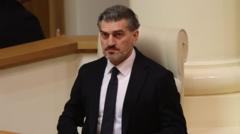Georgia is experiencing escalating political unrest as the parliament appointed former footballer Mikheil Kavelashvili as the new president, amidst 17 days of widespread pro-European Union protests across the nation. Kavelashvili, an ex-MP from the ruling Georgian Dream party, was the sole candidate and received overwhelming support from 224 members of Georgia's electoral college.
However, his election has been met with backlash from the four main opposition groups, who have rejected the results of the October elections, claiming they were manipulated. As tensions mounted, large gatherings of protesters congregated outside parliament, demanding new elections, reflecting the public's frustration over the government’s decision to suspend EU accession negotiations until 2028.
Outgoing president Salome Zourabichvili denounced Kavelashvili's election as a “travesty,” emphasizing her view that she is the legitimate head of state. In response, Prime Minister Irakli Kobakhidze dismissed her authority, asserting that Georgia possesses robust state institutions to navigate through this political crisis.
The protests, highlighting a significant longing for integration with the European Union, have been particularly fierce since late November when the government halted its EU accession talks. Citizens display EU flags during nightly demonstrations, urging immediate reforms and transparency while mobilizing various professional sectors in their calls for change.
Kavelashvili, a founding figure of the People’s Power party, accused opposition members of being foreign agents, further stoking divisions in the political landscape. This party had previously aligned with Georgian Dream during the elections but now claims to be a “healthy opposition” within parliament.
Internationally, the EU and US have condemned the Georgian government for democratic backsliding, revealing growing concerns over human rights violations, including accusations of police brutality towards protesters and journalists. More than 460 arrests were made in recent weeks, amidst accusations of torture and mistreatment of detainees, leading to calls for international sanctions against top government figures.
As the political fabric of Georgia faces unprecedented strain, the clashing narratives of pro-EU aspirations versus increasing authoritarianism will continue to unfold, prompting vital discussions among the global community. The stakes for Georgia remain high as citizens strive to redefine their democratic ideals in the face of significant opposition and systemic challenges.



















